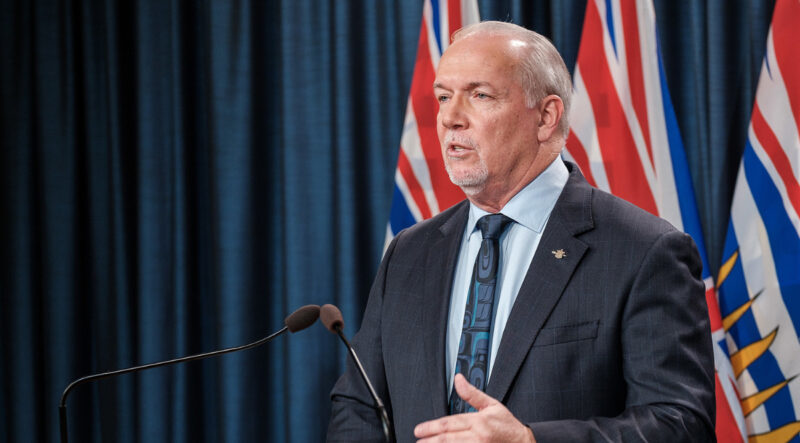Coastal communities at risk if salmon farm licences expire: Premier Horgan
If Ottawa does not renew 79 soon-to-expire salmon farming licences, it would eliminate hundreds of aquaculture jobs, undermine the economy of dozens of coastal communities, and violate First Nations rights, says B.C. Premier John Horgan
By Fabian Dawson
SeaWestNews
B.C. Premier John Horgan has warned Ottawa that dozens of coastal communities, which rely on aquaculture, face dire economic consequences if it does not renew 79 expiring salmon farming licences.
“Regrettably there is widespread concern in coastal communities that your government is poised to make a decision in coming days that will eliminate many if not all salmon farming licences,” said Horgan, in the letter to Prime Minister Justin Trudeau, that was released to SeaWestNews.
“If true, this action would eliminate hundreds of jobs at a stroke and undermine the economy of dozens of coastal communities,” read the letter.
According to a recently released report, British Columbia’s indigenous and non-Indigenous coastal communities will lose more than 4,700 jobs and $1.2 billion in economic activity annually, if the 79 salmon farming licences are not renewed.
The renewal of these licences, which are set to expire June 30, have been in limbo after the government decided to phase out salmon farms in BC’s Discovery Islands as part of a wider pre-election promise to transition all open net salmon farms on the west coast.
Federal Fisheries Minister, Joyce Murray said: “The decision will be made when it needs to be made,” at a press conference in Vancouver last week.
Horgan also cautioned Ottawa that its actions could end up violating the rights of First Nations who want salmon farming in their traditional territories.
“Worse, it would fly in the face of our governments’ commitment to UNDRIP given the stated intention of a number of First Nations to pursue salmon farming. I urge you to provide assurance to the salmon farming sector that an appropriate transition program will be implemented-one that considers their interests and concerns,” he said.
“Any federal licensing decisions should be made in a thoughtful and systematic way that fully engages those First Nations most impacted by the decision, provides the necessary time and clarity for businesses to adjust investment decisions, and does not pre-empt larger policy decisions by Canada, BC and First Nations on the future of the industry,” the letter stated.
“Development of a transition plan for open-net pen salmon farming must also include a corresponding transition plan for those First Nations and communities that rely on the economic opportunities provided by the salmon farm industry, as well as a new technology adoption plan that may provide new economic opportunities in BC.”
Farmed Atlantic salmon is BC’s top international food export at $562 million playing a key role in the local and sustainable food supply, while supporting about 6,500 full-time, year-round jobs near rural and remote Vancouver Island, Central Coast, and Sunshine Coast communities.
Twenty BC First Nations have partnership agreements for farming salmon in their territories resulting in 80% of all salmon farmed in the province falling under a beneficial partnership with a First Nation.
The Tlowitsis First Nation is one of them. It is calling for more salmon farms in its traditional territory that lies near an area where marine operations are being phased out by the Trudeau Liberals, at the behest of anti-aquaculture activists.
“Adding more farms in our territory is the clear way forward,’ said Chief John Smith of the Tlowitsis First Nation, after applying with Grieg Seafood BC Ltd. for an additional salmon farm in the Clio Channel.
On British Columbia’s central coast, in the heart of the Great Bear Rainforest, the Kitasoo/Xai’xais community holds six of the 79 soon-to-expire salmon farm licences.
Band Councillor, Isaiah Robinson, who is also the General Manager of Kitasoo Development Corporation, said he is working with 17 other First Nations to urge the federal government to renew the licences.
“It will impact this nation so much so it’s going to be hard to recover…we can’t just find any industry to plop in here and make work,” he told IntraFish.
The recent letter to Trudeau followed a meeting organised by North Island NDP MLA Michele Babchuk which brought together leaders from First Nations, municipal, and regional governments, industry, chambers of commerce and labour from across the region to discuss concerns about the future of our coastal communities.
“I look forward to continue working with these leaders and our federal counterparts to create a stable, well-thought-out transition plan for the finfish aquaculture industry,” she posted on her Facebook page.
Babchuk will be organizing a delegation of community leaders to travel to Ottawa to communicate their concerns.
Among those expected to be in the delegation is Port Hardy Mayor Dennis Dugas, whose community relies heavily on aquaculture.
In a video posted by the BC Salmon Farmers Association, Dugas said:
“The open net fish farming industry has been a part of our area, and it has been a very big part of our community. It has grown exponentially over the years, and it has become what it is today; a very important part of our community.”
He said if the expiring licences are not renewed “it is going it is going to be a terrible situation on our community”.
LETTER FROM THE PREMIERE
(Supplied Image of B.C. Premier John Horgan)

